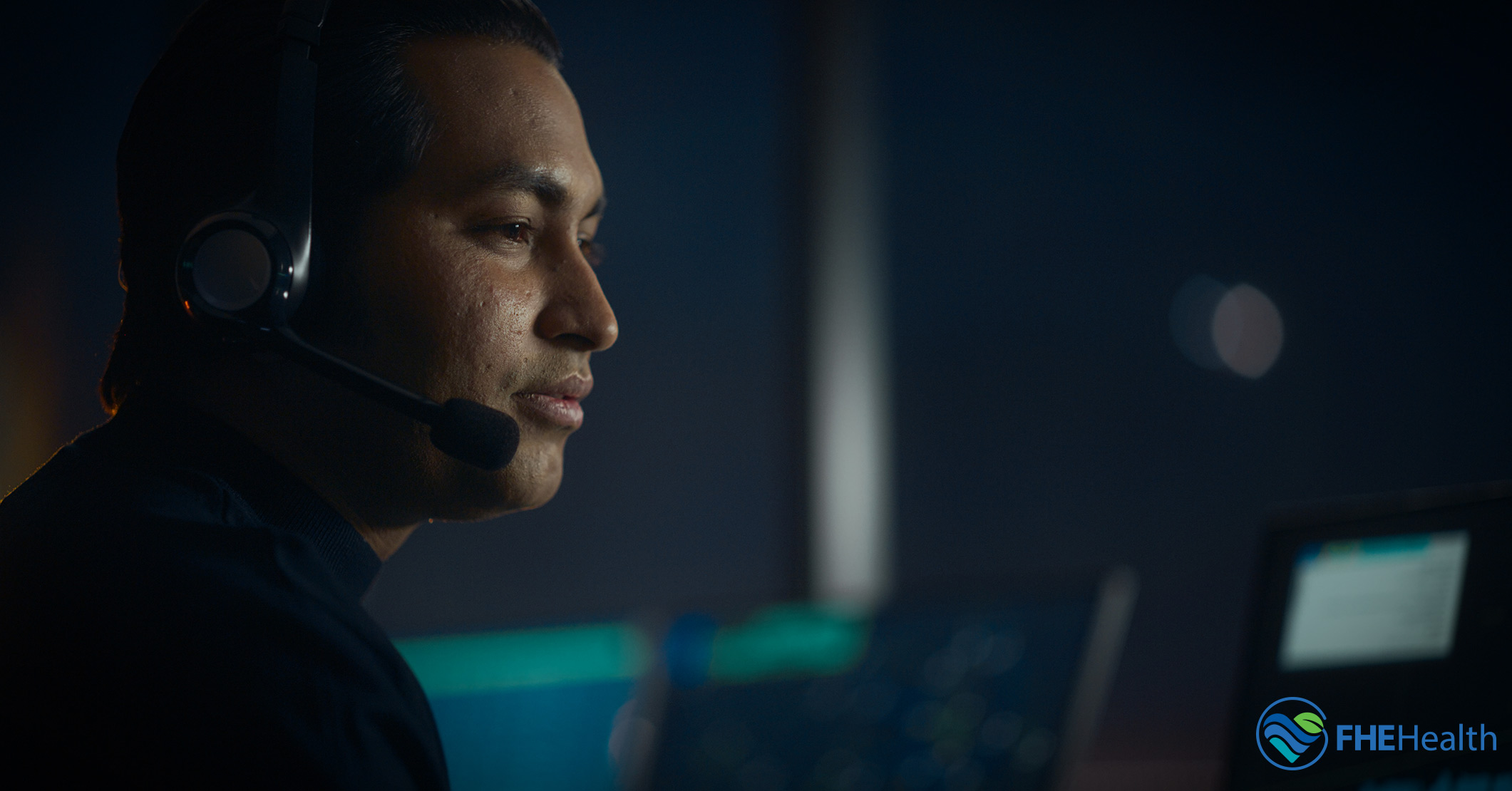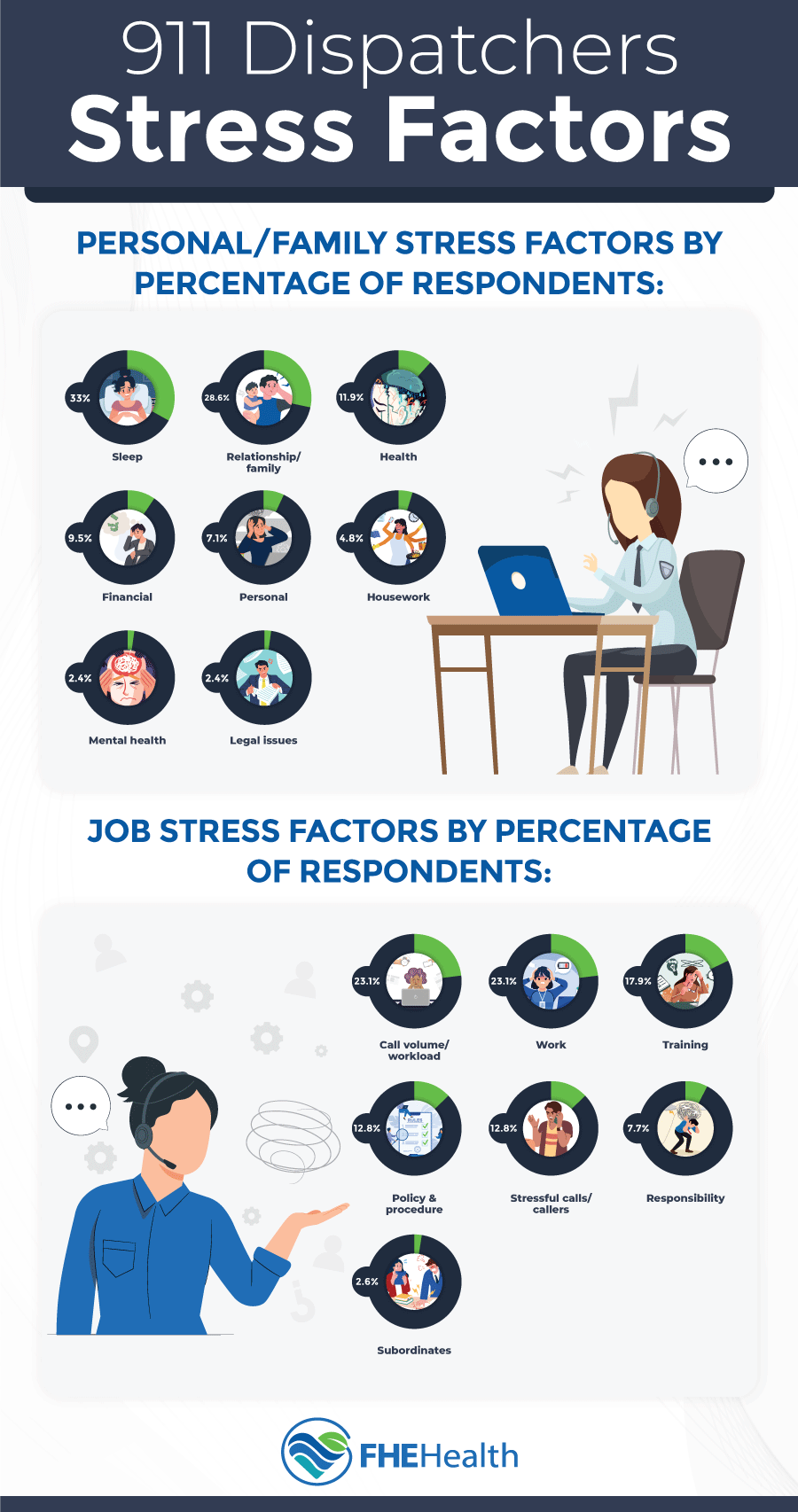
Emergency dispatchers may never set foot on the scene of a crime or accident, but every day, they’re faced with challenges and trauma that can impact their mental health. These workers are the bridge between people in crisis and first responders. They are responsible for sending assistance to emergency and nonemergency situations alike. Their work is often high-stress, fast-paced, and emotionally demanding. That can take a mental health toll….
Behind the Scenes: The Demands and Stressors of Dispatchers’ Mental Health
Every year, about 240 million calls are made to 911 nationwide. When someone calls the emergency number, they trust the person on the other end of the line to guide them through some of the most traumatic moments of their life. Dispatchers have to stay clear-minded and calm as they talk to people in the midst of home invasions, domestic violence situations, burning homes, automobile accidents and fatalities, and even murders. The job requires multitasking, on-the-spot problem-solving, and remaining composed in the face of scary, dangerous, and heartbreaking situations.
On top of this, dispatchers typically work very long hours. The job has a high turnover rate, with the typical dispatch department having to replace about a quarter of its staff every year. The hiring and training process is lengthy, meaning that a significant amount of responsibility falls on the shoulders of a few individuals. As a result, dispatchers often work 10- to 12-hour shifts, along with weekends and holidays. There’s little downtime to decompress between calls, and in most cases, there’s no process for debriefing after particularly stressful calls.
These demands and stressors can take a serious toll on the mental health of dispatchers, not only impacting their careers but also their lives outside of their jobs. Chronic job-related stress can cause physical health issues and problems in their relationships, further increasing the effect the job has on their quality of life.
The Importance of Dispatcher Mental Health: Addressing the Unseen Struggles
Unfortunately, most dispatchers don’t get adequate support for their mental health, making them vulnerable to burnout and illnesses such as depression and post-traumatic stress disorder. According to a 2016 study that sought to understand the mental health struggles of 911 dispatchers, those working in this field showed the same level of physical and mental health complaints as police officers and first responders. For example, they were just as likely as those in the field to experience sleepless nights due to their work, and they were just as likely to self-medicate with substances such as alcohol.
Taking emergency calls every day means having the responsibility of guiding callers through life-altering traumas and being a witness to their experience but feeling powerless to provide hands-on help. It’s essential for dispatchers to have support from their management, peers, friends, and family to help them handle work-related stress. The combination of informal support from loved ones and formal support from trained peers or mental health care professionals is essential for dispatchers’ mental health.
Supporting Our Lifelines: Mental Health Care Strategies for Dispatchers
Dispatchers interact with traumatic, scary, and dangerous situations on a daily basis, and stress is a natural byproduct of regular exposure to the pain and fear of others. While this stress may be unavoidable, there are a few things dispatchers can do to keep it from becoming disruptive to their quality of life outside of work.
Be Self-Aware
It’s important for dispatchers to be aware of their own histories, health issues, and biases that may play a role in their choice of career as well as how that career affects their mental health. For example, there’s some research that suggests that about half the people working in a trauma-related field have a personal history of exposure to trauma. While their career choice may come from their desire to be the advocate or helper they wish they’d had during their own experience, this may result in them internalizing the pain they see day-to-day, adding to their job stress. Additionally, mental health issues such as depression or anxiety, as well as physical health issues, can have an impact on the way the individual’s job affects them.
Manage the Workload
The high turnover rate and long training process often mean that there’s more work than what can be reasonably handled by available workers. As a result, dispatchers typically work long hours with little downtime between shifts. As difficult as it is, it’s important to maintain realistic work hours and avoid taking on extra shifts whenever possible. From a practical standpoint, if someone pushes themself to take on more hours than they can reasonably handle, they’re more likely to burn out and switch careers, further adding to the problem of understaffing. Looking at the job as a marathon, not a sprint, can help dispatchers manage their workload.
Maintain a Healthy Work/Life Balance
Life outside of work undoubtedly has its own stressors and duties, but it’s important to be intentional in scheduling time to unwind and enjoy hobbies that help with reducing stress. This looks different for different people, but some examples of this may include hiking, art, yoga or reading. This can help the individual stay balanced and help them remember that there’s life outside of their work.
Listening and Healing: How to Address Trauma in Dispatchers’ Work
Dispatchers have an important role in helping individuals get the help they need in the midst of a dangerous or traumatic event. There’s no “normal” day for a dispatcher—every day comes with its own challenges. When these challenges aren’t addressed and the worker feels like their stress is unacknowledged or dismissed, it can quickly become destructive.
Addressing trauma in dispatchers’ work requires a multifaceted approach that includes adequate training, regular debriefings and diffusion of emotional pain, and ongoing support from friends and family. Professional help through programs such as Shatterproof FHE Health can be a lifeline for dispatchers and other first responders who are experiencing compassion fatigue and burnout.
Coping with the Unpredictable: Resilience and Mental Health for Dispatchers
Dispatchers who are resilient are more likely to feel like they’re in control of their lives, including their work. They use less sick time, are less likely to have their jobs affect their quality of life, and are happier in general. There are several ways dispatchers can build resilience, including:
- Seeking and accepting support from peers; sharing the mental load and getting support from someone who knows the job and its challenges are essential for managing stress
- Practicing limited empathy; empathy is an important trait for dispatchers, but so is a certain level of detachment that enables them to do their job without getting caught up in the emotion of the situation
- Avoiding over-identification; it’s natural for the dispatcher to identify patterns and similarities between the victim on the other line and their own lives—maybe they have a child the same age as the child in distress or they’ve experienced a similar automobile accident—but it’s important for them to remember that each situation is unique and one person’s tragedy doesn’t have any connection with their own lives
- Committing to self-care; make an effort to maintain a healthy diet, adequate sleep and a little bit of physical activity every day
Breaking the Silence: Raising Awareness of Mental Health in the Dispatcher Community
Members of the dispatcher community can feel like their work is invisible and their job is thankless, making it important to raise awareness of the demands of their job and the toll it can take on their mental health. Fortunately, there are several resources available to those in this field, including:
- National Alliance on Mental Illness
- 1st Responder Conferences
- Warrior’s Rest Foundation
- Shatterproof FHE Health
- Cordico
- PTSD911 Presents podcast
Supporting these foundations and other programs that address the mental health of dispatchers is an effective way to raise awareness of the challenges workers face.







